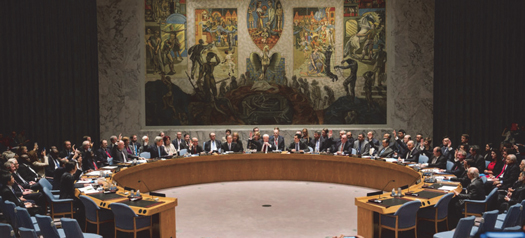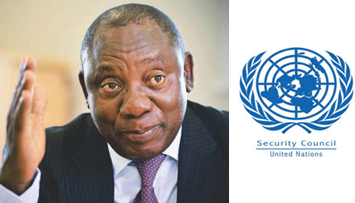Africa seeks two permanent seats on United Nations Security Council
By Jehron Muhammad | Last updated: Oct 3, 2018 - 10:16:17 PMWhat's your opinion on this article?

Assembly of the UN General Assembly Photo: UN.org
|
South African President Cyril Ramaphosa had recently raised this issue. But it’s not a new call from the Motherland for expanded power at the United Nations.
In 2009, the then chairperson of the African Union and president of the Socialist People’s Libyan Arab Jamahiriya, Muammar Gadhafi, addressed the UN General Assembly and took the UN Security Council to task. He denounced, while waving a copy of the UN charter, the permanent setup of the Security Council. The arrangement encouraged the treatment of other countries as “second-class citizens,” said Col. Gadhafi.

South African President Cyril Ramaphosa
|
The Libyan leader called it “political feudalism for those who have a permanent seat.” “It should not be called the Security Council, it should be called the terror council. It did not provide us with security but with terror and sanctions,” he said as he ripped a page out of the charter.
“Permanent is something for God only. We are not fools to give the power of the veto to great powers so they can use us and treat us as second-class citizens … . Veto power should be annulled,” he added, before tossing the UN charter over his shoulder.
There are five permanent members on the UN Security Council. They include China, France, Russia, the United Kingdom, and the United States. Permanent members have veto power. This means that a permanent member can kill any “substantive” resolution.
Attending the United Nation General Assembly for the first time and invoking the historic words delivered by Nelson Mandela, South Africa’s first post-apartheid president elected in 1994, Cyril Ramaphosa urged global leaders to forge a more representative, equal and fair UN.
“The millions across our globe who stand expectant at the gates of hope look to this organization to bring them peace, to bring them life, to bring them a life worth living.”
Mandela, who died in 2013, would of celebrated his 100th birthday this year.
“As we mark the centenary of the birth of this great global leader, we are bound to ask whether the United Nations has met the needs and the expectations of the millions who stand at the gates of hope,” Ramaphosa said during a speech delivered to the General Assembly in New York.
“We are bound to ask what contribution the United Nations has made to a more peaceful, more prosperous and more equal world. The UN must become what billions of people across the world want it to be, a representative and truly democratic global parliament of the people.”
Wrapping up his speech, he encouraged the “reform of the United Nations, and particularly its Security Council” as “a priority.” This is the only way “we are to give full effect to the values and principles enshrined in the UN Charter,” he said.
Why he didn’t publicly encourage the UN to allocate two permanent seats on the Security Council to Africa as he had suggested in South Africa is anyone’s guess.
Prior to attending the 73rd United Nations General Assembly, Ramaphosa addressed South Africa’s diplomatic community, among them ambassadors, high commissioners, consuls-general and charge d’affaires, saying in New York the African Union would call for Africa to be allocated two permanent seats on the UN Security Council.
“As we go to this assembly, South Africa will strongly advocate for the comprehensive reform of the UN Security Council. We are calling for the expansion in the permanent and non-permanent category of the Security Council from 15 to 26 seats.”
Ramaphosa, according to published reports, felt that for Africa to be fully represented at the Security Council, with its 54 nation states, it should receive no less than two permanent seats and a total of five non-permanent or elected seats. Ramaphosa was speaking to South African diplomats in the capital Pretoria.
The South African president added, “Since the advent of our democracy, South Africa has positioned itself as a force for good in the world and as a contributor to the forward march of humanity.”
South Africa has been elected to serve in the United Nations Security Council for the term 2019-2020 as a non-permanent member.
Ramaphosa said, “South Africa is concerned about the rise over the last two decades of unilateralism in global affairs and the violation of national sovereignty.”
This threatens global peace, security and development, he said.
He also accused powerful nations, obviously referencing countries like the United States, of historically using their power to vote and pass decisions in the UN Security Council—with an often catastrophic impact on other nations. In recent history, these measures have included the overthrow of Libya and the destruction of Iraq.
Ramaphosa believes there is a real need to work together to strengthen multilateral systems of governance and collective global decision making and change an UN unequal structure that makes the Security Council a kind of ruling body.
Along with South Africa, the UN General Assembly elected Germany, Belgium, the Dominican Republic and Indonesia for two-year terms on the Security Council. South Africa was the only African candidate for the position that will be held by Ethiopia until the end of 2018. This is South Africa’s third term as a member of the Security Council.
Ramaphosa has said South Africa will use the two-year term to advance African interests and resolve regional, global and international conflicts. South Africa’s two-year term starts January 1, 2019.
Follow @jehronmuhammad on Twitter.
INSIDE STORIES AND REVIEWS
-
-
About Harriett ... and the Negro Hollywood Road Show
By Rabiah Muhammad, Guest Columnist » Full Story -
Skepticism greets Jay-Z, NFL talk of inspiring change
By Bryan 18X Crawford and Richard B. Muhammad The Final Call Newspaper @TheFinalCall » Full Story -
The painful problem of Black girls and suicide
By Charlene Muhammad -National Correspondent- » Full Story -
Exploitation of Innocence - Report: Perceptions, policies hurting Black girls
By Charlene Muhammad -National Correspondent- » Full Story -
Big Ballin: Big ideas fuel a father’s Big Baller Brand and brash business sense
By Bryan Crawford -Contributing Writer- » Full Story






 Click Here Stay Connected!
Click Here Stay Connected!








